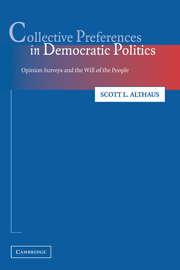Book contents
- Frontmatter
- Contents
- List of Figures and Tables
- Acknowledgments
- 1 Introduction
- PART I ILLUSIONS OF AGGREGATION
- 2 The Power of Noise
- 3 Who Speaks for the People?
- PART II INFORMATION EFFECTS IN COLLECTIVE PREFERENCES
- PART III OPINION SURVEYS IN DEMOCRATIC POLITICS
- Appendix A Political Knowledge Indices
- Appendix B Methodology
- References
- Index
3 - Who Speaks for the People?
Published online by Cambridge University Press: 06 January 2010
- Frontmatter
- Contents
- List of Figures and Tables
- Acknowledgments
- 1 Introduction
- PART I ILLUSIONS OF AGGREGATION
- 2 The Power of Noise
- 3 Who Speaks for the People?
- PART II INFORMATION EFFECTS IN COLLECTIVE PREFERENCES
- PART III OPINION SURVEYS IN DEMOCRATIC POLITICS
- Appendix A Political Knowledge Indices
- Appendix B Methodology
- References
- Index
Summary
The power of the aggregation process to gather individually noisy opinions into a coherent and rational collectivity is held by many to be the reason why low knowledge levels should be of little consequence to the proper functioning of democracy and, more narrowly, to the validity of opinion surveys. Yet while the idea of collective rationality is widely acknowledged in the collective opinion literature, the test of this idea provided in Chapter 2 suggests that aggregation alone has rather limited knowledge-pooling properties. Moreover, while much of the recent work on the dynamics of collective opinion has offered descriptive analysis of trends in collective opinion, very little of this macro-level work has explored the micro-level behavior giving rise to collective preferences. In this chapter I develop a model of collective information effects built on micro-level theories of human cognition. I argue that aggregating individual opinions together may often fail to generate collective opinions that are representative of the populations whose views they are supposed to capture. In contrast to collective rationality models of information effects, I propose a theory of collective information effects in which something approximating collective rationality is but one possible outcome of the aggregation process.
Using a wide range of data from the 1988, 1992, and 1996 American National Election Studies, I show that the people who answer survey questions tend to be better educated, more affluent, middle-aged, white, and male than those who are included in the survey sample but fail to answer questions.
- Type
- Chapter
- Information
- Collective Preferences in Democratic PoliticsOpinion Surveys and the Will of the People, pp. 59 - 94Publisher: Cambridge University PressPrint publication year: 2003



